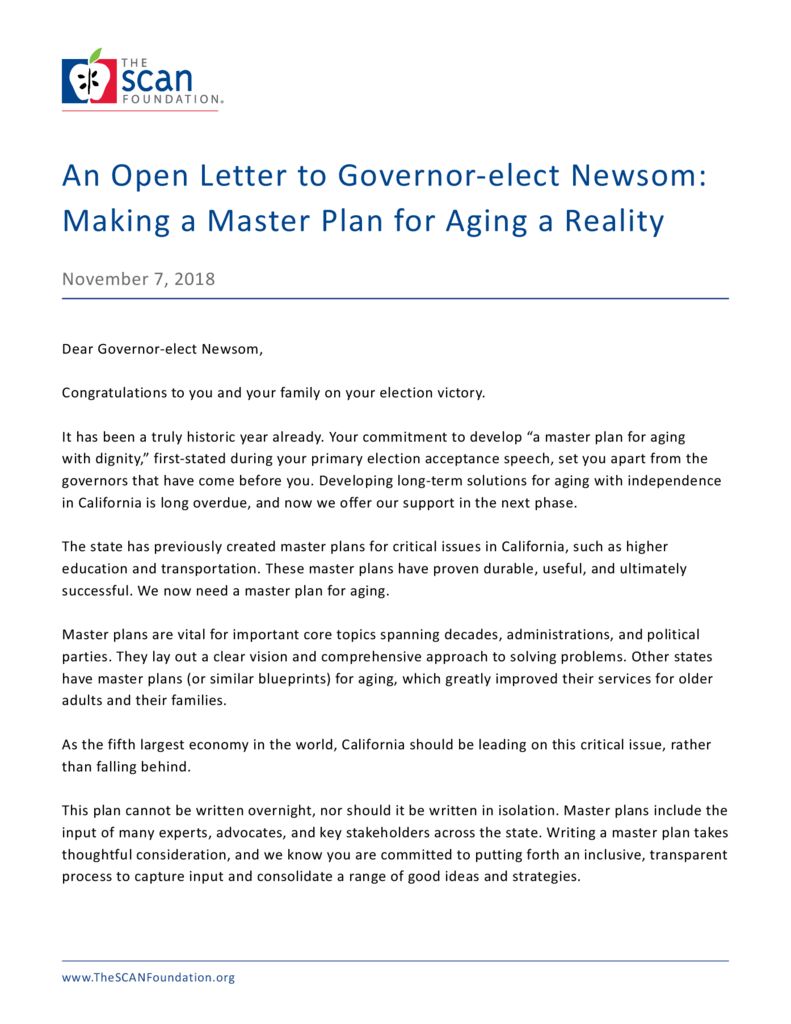An Open Letter to Governor-elect Newsom: Making a Master Plan for Aging a Reality
summary
In this open letter, Dr. Chernof commends Governor-elect Gavin Newsom on his commitment to develop “a master plan for aging with dignity” in California. Dr. Chernof lists key areas that a master plan must address, such as incorporating strategies for older adults to live and age in the place they call home and providing pathways for older Californians to access affordable health care.
Date Updated: 11/06/2018Dear Governor-elect Newsom,
Congratulations to you and your family on your election victory.
It has been a truly historic year already. Your commitment to develop “a master plan for aging with dignity,” first-stated during your primary election acceptance speech, set you apart from the governors that have come before you. Developing long-term solutions for aging with independence in California is long overdue, and now we offer our support in the next phase.
The state has previously created master plans for critical issues in California, such as higher education and transportation. These master plans have proven durable, useful, and ultimately successful. We now need a master plan for aging.
Master plans are vital for important core topics spanning decades, administrations, and political parties. They lay out a clear vision and comprehensive approach to solving problems. Other states have master plans (or similar blueprints) for aging, which greatly improved their services for older adults and their families.
As the fifth largest economy in the world, California should be leading on this critical issue, rather than falling behind.
This plan cannot be written overnight, nor should it be written in isolation. Master plans include the input of many experts, advocates, and key stakeholders across the state. Writing a master plan takes thoughtful consideration, and we know you are committed to putting forth an inclusive, transparent process to capture input and consolidate a range of good ideas and strategies.
To be successful, California’s Master Plan for Aging must:
- Incorporate strategies that allow older adults to live and age in the place they call home.
- Provide pathways for older Californians – those with Medi-Cal, as well as those with only Medicare but living on fixed means – to have access to affordable health care and a range of services that will help them thrive in their communities as long as possible.
- Improve communication and coordination of care among providers and/or between healthand supportive services when circumstances change.
- Recognize that caregivers, both paid and unpaid, are the backbone of our system. We must value them and do a better job supporting them.
- Help Californians understand their care choices and make the most of their health care coverage.
- And finally, aging impacts all public policy in this state. Transportation, Education, Public Safety, Veterans Affairs, and all the other agencies and departments will need to think about aging as they plan for the future and should help inform our state’s master plan.
We look forward to starting.
Sincerely,

Bruce A. Chernof, MD
President and CEO
Continue Reading
This policy brief provides an introduction to The SCAN Foundation’s CLASS Technical Assistance Brief Series, which explores many of the critical issues to be considered for successfully implementing CLASS.
This policy brief describes the broad needs of individuals with disability and the wide range of supportive and environmental solutions that can allow for the most independent living possible. It suggests how findings on social and environmental supports for individuals with disability can inform implementation of CLASS.
This policy brief provides background on the historical development of benefit eligibility triggers in the private long-term care insurance market. Understanding how these triggers came into being can provide important information to those charged with implementing the CLASS Plan.


